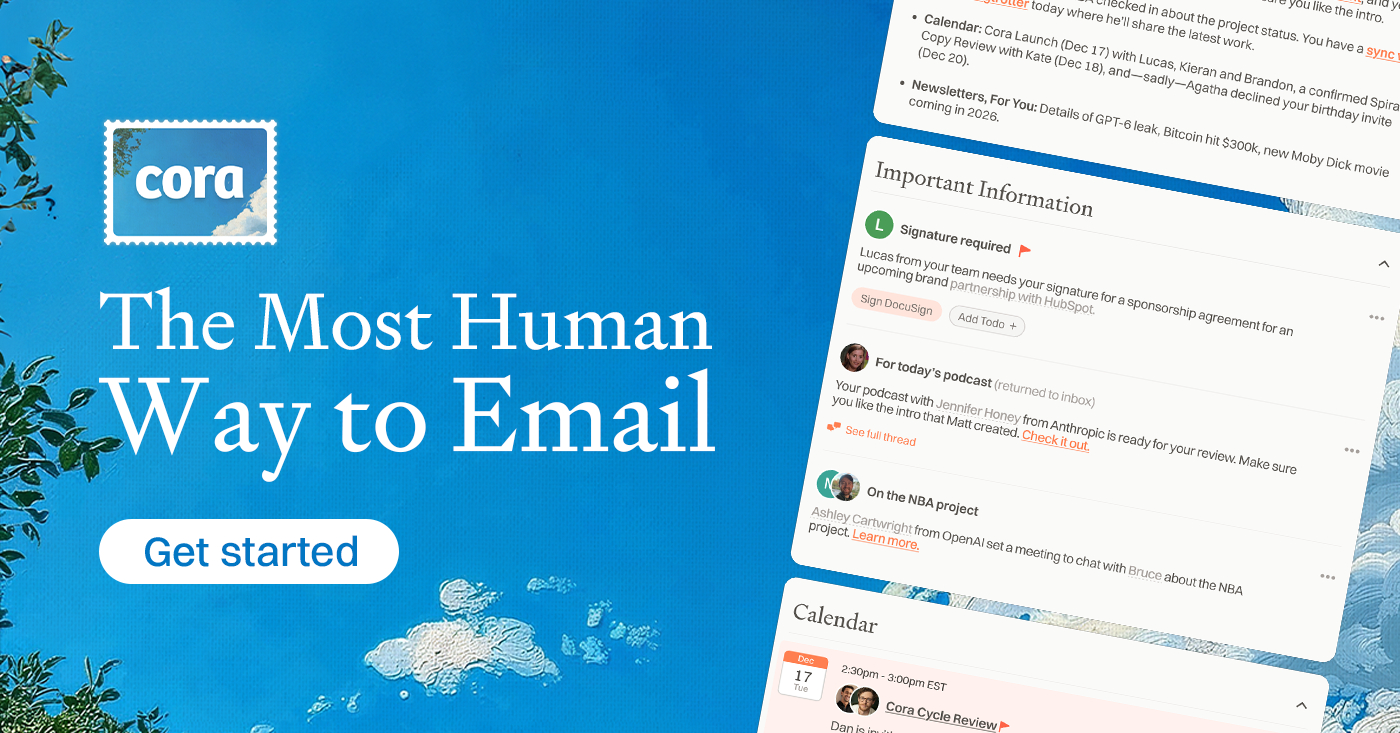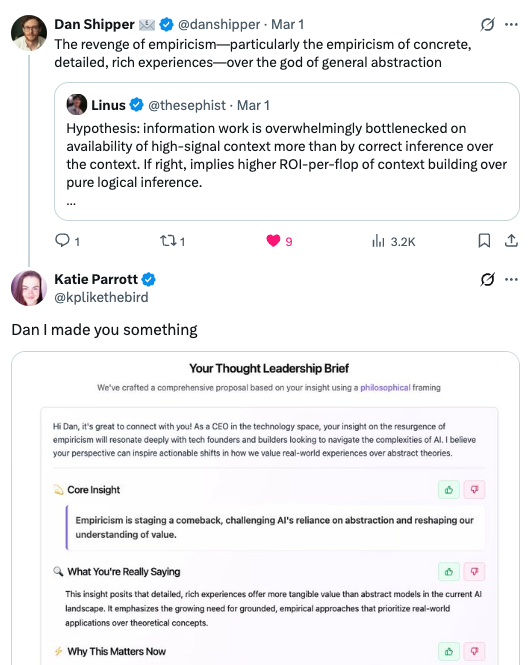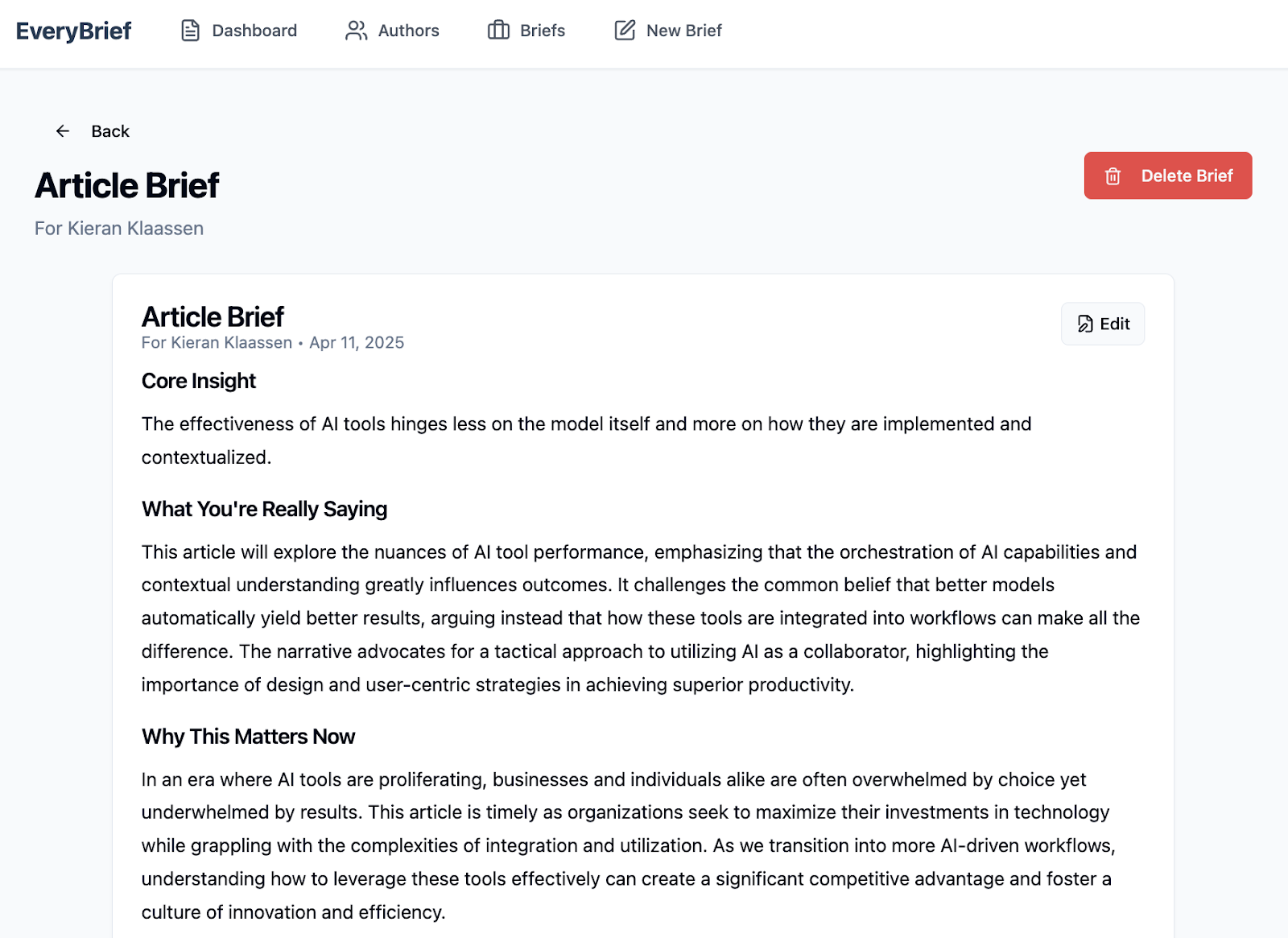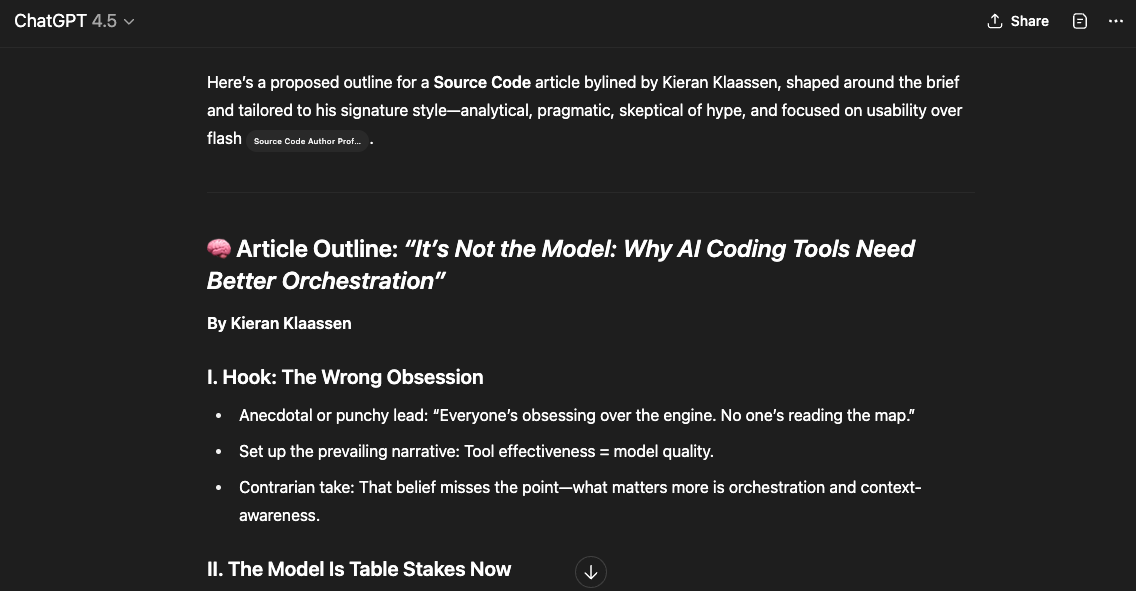
Was this newsletter forwarded to you? Sign up to get it in your inbox.
Two years ago, I was a content marketer who could barely get out of bed. Now, I build AI systems that influence how everyone at Every creates. If that sounds like an unlikely career pivot, that's because it is. It's also one way work can work in the age of AI.
The pivot played out in two acts. Act one started when a bout of depression had me staring at blank Google Docs through tears, desperate for anything that could help. ChatGPT became my lifeline—first for basic tasks, then for entire workflows. Within months, I had prompts for everything: speedrunning first drafts, turning revisions around in 20 minutes, transforming interview transcripts into outlines before my coffee got cold. I went from barely functioning to hyperproductive, from analog marketer to AI power user.
Act two started at 2 p.m. on a Thursday one month ago. I was in a Zoom call with Every CEO Dan Shipper and editor in chief Kate Lee, talking about how I could help operationalize AI at Every. By 2:27 p.m. ET, the news was out on the company's Discord, and Dan was posting on X about how I was going to automate him out of a job.
What began as a random assortment of hacks and side projects had somehow coalesced into a job description. And I think that's an under-represented dimension of how AI is impacting work. You see plenty of articles questioning the long-term stability of the white-collar labor force or the employment prospects of new grads. What you don't see as often are stories from people moving into the weird new spaces that AI is opening up.
Millions of knowledge workers are staring at ChatGPT wondering if they're about to be automated out of existence. The plot twist of AI is that the skills they already have—the ones that got them this far—are exactly what they need to thrive in the AI era.
As baffling as it is to me, I am one of those people who stumbled into AI's weird new spaces. This isn't a career guide or a listicle of "10 AI skills you need now." It's the story of how a German literature major with depression accidentally became an AI operations lead—and how a series of experiments, screenshots, and one Zoom call turned my side projects into a job that I didn't know existed six months ago.
Make email your superpower
Not all emails are created equal—so why does our inbox treat them all the same? Cora is the most human way to email, turning your inbox into a story so you can focus on what matters and getting stuff done instead of on managing your inbox. Cora drafts responses to emails you need to respond to and briefs the rest.
AI doesn't care about your résumé
It didn't occur to me how sudden my career turn was until I tried explaining it to my parents. During one call, as I yammered on about “AI-powered workflows” and “vibe coding,” my mom interrupted: "I'm just trying to understand where all this is coming from."
Now my parents have a post-call ritual. Mom asks Dad, "Did you understand any of what she said?"
He replies, "No, but as long as she's happy."
The large language model on the other end of my laptop is just as oblivious to my credentials as they are. ChatGPT has never glanced at my LinkedIn profile. Claude doesn't know I'm "not technical." The models reward two inputs: clear thinking and good questions.
That's exactly what my humanities degree trained me to do. Four years of deconstructing German grammar and explicating Victorian poetry taught me to slice sprawling, baffling texts into bite-size logical units—the same muscle I use now when parsing error messages or evaluating prompt outputs.
AI doesn't care about your traditional qualifications. It rewards completely different things: pattern recognition from years of analyzing sales data, the persistence you developed debugging Excel formulas, the clarity you learned writing executive summaries that actually get read. These underlying skills, the ones that seldom get their own line on a résumé, are what AI makes visible—and valuable. The cognitive muscles you've been building all along, the ones no certification captures, might be exactly what makes you good at this.
Your secret experiment could be someone's solution
AI found its way into my life as a lifeline, not a career move. In late 2022, I was trying to hold onto a job as an in-house content marketing manager while wading through waves of debilitating depression when I first heard about this hot new tool called ChatGPT.
At the time, most of what I heard was that it could write sonnets and solve coding problems—cute party tricks, but not the kind of thing that screams this will change how you work. But as I stared at the mountain of content briefs I needed to complete on a weekly basis, I wondered: Could it draft a first version of these briefs, just so I could get something on the page?
I took one of my existing brief templates—the kind with sections for target audience, key messages, and SEO keywords—and pasted it into ChatGPT with a request: "Fill this out for an article about [topic]." The result wasn't perfect, but it was a shitty first draft. And that "something" gave me enough momentum to climb over the depression hump.
It started as a coping mechanism, but it didn’t stay that way. I noticed patterns in the briefs, tweaked the wording in my instructions to the model, and over time learned how to coax results out of the model that, with a final pass and polish from me, I felt comfortable sending along to my agency client. I was learning to anticipate what the model needed to hear to produce what I needed to see—which details to emphasize, how to structure my requests, when to break complex requests into smaller steps.
And the model kept leveling up right beside me. Each OpenAI update unlocked a new rabbit hole to explore. That feedback loop—better capability → better results → higher curiosity—is the engine that turned a coping mechanism into a new career path. That’s honestly the best advice I can offer: Pay attention to which AI experiments give you energy instead of draining it. Notice when you're genuinely excited to see what the model spits out next. That little spike of, "Oh, what if I tried..."—that's your compass. Most people are so busy worrying about whether they're "doing AI right" that they miss the signals their own curiosity is sending.
Show your work
By the time I landed at Every last September, writing a column about how technology has changed work over time and co-writing with the Studio engineers and designers, ChatGPT was already my constant copilot. I used it to brainstorm story angles, turn interview transcripts into outlines, and try different turns of phrase until I found just the right one. But I was still on my home turf of writing. I was a writer who happened to use AI to write faster.
Then came Think Week, the five-day research and development sprint where doing something besides our everyday job is the point. Our prompt one day was to use an AI tool we’d never used before. I started with addressing my own need for a personal website, and after vibe coding for two hours and coming out with a fully functional personal website, I wondered what else I could build. Within days I was juggling GitHub, Supabase, OpenAI APIs, and webhooks I barely understood.
I kept the first projects selfish: a new site to showcase my work portfolio, and a "thought leadership brief" generator that turned half-baked tweets from clients and prospective clients into outlines and proposals to get them excited about new story ideas.
The inflection point arrived when I tweeted Dan a screenshot of an essay brief I'd built for him based on an X post of his using my thought leadership tool. I copy-pasted his tweet into the app I’d built with the AI-powered app builder Lovable, gave it a few extra details about who Dan is and what he does, and a few seconds later the app spat out a proposal for how Dan could expand his tweet into an essay. Twenty minutes after I sent the screenshot he was in my Discord DMs: Could we do something like this at Every?
Every AI experiment you run in private is potentially solving someone else's headache—but only if they can see it. The line between "handy side hack" and "new job description" turned out to be just pressing Send.
Share your toys
I'd caught the AI operations bug. By April, I needed another sandbox in which to play around with AI, so I grabbed Source Code—the column by Every’s Studio team—and treated the writers themselves as data. I scraped their Twitter feeds, distilled each voice into an "AI avatar" —a summary of who each person is, what they work on, what’s important to them, and what they sound like—and let those personas generate content in their own style. Because this avatar is trained on things that they’ve actually said, the briefs and outlines they develop will be that much closer to the author’s perspective, which should, in turn, make them more excited to move forward with the idea.
I DM'ed one outline from "AI Kieran" to the real Kieran Klaassen, the general manager of our inbox management tool Cora, half-expecting silence. Instead, 48 hours later he messaged that he'd written the draft—and that piece went on to be published in Source Code.
The feeling of creating something using AI and seeing another person get value out of it was like the high of publishing a new story but with the volume turned way up. I knew this wasn't just a side project anymore.
Follow your curiosity
Which brings us back to that Thursday Zoom with Kate and Dan. It lasted less than half an hour, but it rewrote my job description. They needed someone to weave AI into Every's editorial process to cut down on review cycles, eliminate the tedious parts of proofreading and fact-checking, and help our writers produce without sacrificing quality. I'd already shown—via one rogue brief and a handful of screenshots—that the weave was possible.
There was no talk of qualifications or "minimum five years of GPT-4 experience." How could there be? The technology hadn't been around that long. Proof of concept was the only credential that mattered, and I happened to have it open on my desktop.
That's the strange physics of frontier tech: Expertise is measured in curiosity cycles, not calendar years. The gap between "I wonder…" and "Here's a live demo" is so narrow right now that showing your latest experiment is often indistinguishable from presenting a résumé.
I didn't arrive at that Zoom by grinding through certificates or memorizing API calls. I arrived because I kept chasing questions that lit me up, like, "Can I turn a tweet into a brief?" "What if AI could mimic a specific writer's voice?" "Could I build a tool that does in minutes what used to take hours?"—and then posted the answers where other humans could see them. Curiosity sparked an experiment, the experiment produced a tangible win, the win got shared, and the share invited a bigger problem to solve.
Rinse, repeat, collect a new title.
The loudest story about AI still sounds like a funeral dirge: entry-level jobs disappearing, knowledge work hollowed out. But I've watched a quieter story unfold in my own inbox. An English-German double major content marketer taps a language model to outrun depression, tinkers in public, and—almost by accident—steps into a job that didn't exist when the quarter began.
The frontier is wide open precisely because nobody has senior-level credentials yet. The raw material is whatever problem lands on your desk tomorrow and the sliver of curiosity that makes you ask, could an LLM handle the boring part? For me, that was content briefs that took 45 minutes to write from scratch. For Every's editors, it's catching inconsistent capitalization, checking for image captions, and making sure quotes are properly attributed. It’s the stuff that has to get done but doesn't require human brain power to do it (anymore).
So next time you finish an AI experiment—no matter how scrappy—pause before you file it away. Ask yourself: Did it save real time? Can you show the before-and-after in under a minute? Who else wrestles with that same pain?
If you can answer all three, you've found the edge of a path that didn't exist yesterday. Send the screenshot. Let the world's inevitable, "Wait, how did you do that?" become your next pivot.
The age of AI isn't waiting for anyone to hand out permission slips. It's moving at the speed of curiosity—yours included.
Katie Parrott is a writer, editor, and content marketer focused on the intersection of technology, work, and culture. You can read more of her work in her newsletter.
To read more essays like this, subscribe to Every, and follow us on X at @every and on LinkedIn.
We build AI tools for readers like you. Automate repeat writing with Spiral. Organize files automatically with Sparkle. Deliver yourself from email with Cora.
We also do AI training, adoption, and innovation for companies. Work with us to bring AI into your organization.
Get paid for sharing Every with your friends. Join our referral program.
The Only Subscription
You Need to
Stay at the
Edge of AI
The essential toolkit for those shaping the future
"This might be the best value you
can get from an AI subscription."
- Jay S.
Join 100,000+ leaders, builders, and innovators

Email address
Already have an account? Sign in
What is included in a subscription?
Daily insights from AI pioneers + early access to powerful AI tools










.53.16_AM.png)
.png)

Comments
Don't have an account? Sign up!